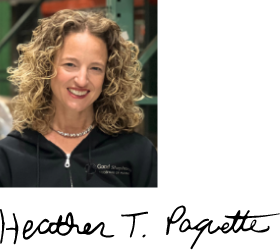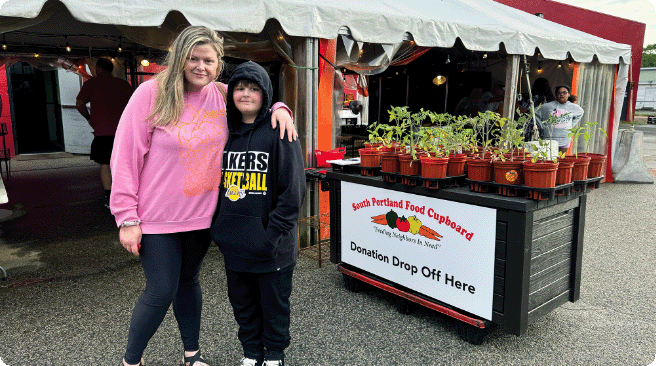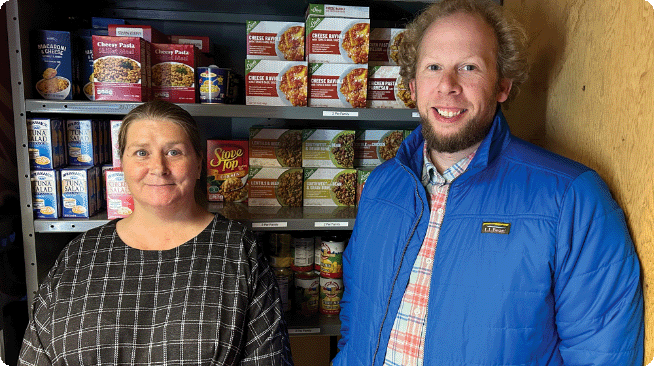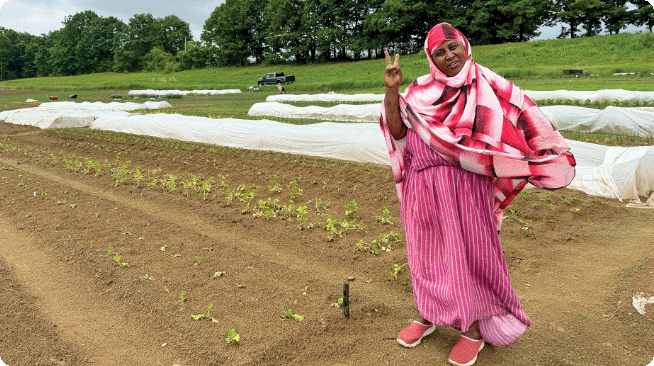Letter From the Food Bank
Dear Friend,
Fall is just around the corner. The new school year will be starting, bringing excitement and new routines.
Sadly, for so many Mainers, food insecurity and hunger are part of the routine all year. We are working every day to ensure Mainers have the nutritious food they need to stay nourished and healthy. But the cost of food remains elevated, and more families and older Mainers are seeking help at a time when we have a gap in resources due to federal funding cuts.
During the school year, children receive free breakfast and lunch, easing the challenge families face in providing extra meals at home. But the rising cost of essentials and changes to critical federal programs like SNAP have strained household budgets that were already tight, bringing more families to their local food pantry.
Thanks to you and your tremendous support, we can continue working to provide as many nutritious meals as possible. I hope you enjoy this edition of Helping Hands and are reminded of the vital difference your support makes to families in our communities.
Then, I hope you’ll consider making a gift today to help even more children, families, and older Mainers during these tough times. When every $1 you give can help provide food for two nourishing meals and support for hunger-ending programs, your generosity can help change lives and provide a strong start to the school year.
Gratefully,

Heather Paquette
President

Without a support system, Jennifer had a hard time making ends meet.
Helping Mainers Provide for Their Families
Owen’s face lights up as he shares his favorite foods. “Donuts, cheese, bread, and cantaloupe!”
His mom, Jennifer, laughs. “At 11 years old especially, he does not stop eating food.”
Sadly, simple joys like these haven’t always been easy for their family to come by.
Jennifer has faced many hardships. Her son Owen’s dad passed away in a car accident when he was just a baby. She thought moving in with her mom would help them both, but they just couldn’t keep up with the mounting expenses. For a while, they didn’t have a home. “I fell apart,” Jennifer says.
She persevered through those difficult circumstances, graduating from the McAuley Residence recovery program and taking parenting classes to get back on her feet.
But just as things started to stabilize, Owen was diagnosed with autism. He was out of school for more than a year and a half, and Jennifer cut back her work hours to take care of him. Then she lost her mom to cancer.
With reduced SNAP benefits and rising expenses for rent and utilities, Jennifer worried how she would provide food for her son until a family-support specialist recommended the South Portland Food Cupboard, a partner of Good Shepherd Food Bank.
Now Jennifer can access the fresh produce she normally wouldn’t be able to afford at the grocery store, and pick up some of Owen’s favorite foods.
“It’s hard to hear your kids [say] they’re hungry,” Jennifer says. “No parent wants to hear that. [South Portland Food Cupboard] can be a huge help and bridge that gap.”
When resources get tight, having a welcoming pantry nearby makes a big difference. Thank you for helping Mainers access nutritious food.

According to Michael, Eastern Maine Community College’s partnership with Good
Shepherd Food Bank “is a real game changer!”
“What a Lifesaver This Is”
In the Johnston Gym of Eastern Maine Community College (EMCC), students quietly shop the shelves of the campus food pantry — a vital program for low-income students and their families.
According to Michael Schwabenbauer, who leads the support services team for students, the need for food assistance on campus has grown dramatically in the past few years. During an average semester, the EMCC Food Pantry serves 80–100 students and families each month. But the pantry remains open even during breaks, supporting 20–30 students who are unable to leave campus.
“What a lifesaver this is,” says Michael. “We want to fulfill this need to take the pressure off so they stay in school. We let them know to come often — there’s enough for everyone.”
The pantry also offers local emergency food delivery, when volunteers drop off dorm-appropriate foods to students each week, along with a small cookbook of recipes they can make with limited resources.
Students can even help tend to the community garden, growing produce that stocks the pantry shelves and creating a sustainable cycle of support that cuts many students’ grocery budgets in half.
Former student Cathy, who went on to work at the pantry through AmeriCorps, understands the pantry’s value firsthand. “Many are struggling with grades and life problems,” she says. “If we can help with food, they can focus on school and paying other bills.”
Your support helps keep healthy food accessible for students at EMCC — and beyond!

From Somalia to Maine: Habiba brings generations of farming knowledge to her plot at
Cultivating Community.
Farmers Like Habiba Are Ready for the Season’s Harvest
It’s hard to believe that autumn is coming. As students get ready for the upcoming school year, local farmers like Habiba are busy tending to their crops and preparing for the harvest. A dedicated farmer with Cultivating Community, she and her husband have cultivated a plot of land for the past eight years, working to create a sustainable livelihood through agriculture.
Habiba’s farming expertise has deep roots. She’s originally from Somalia, where she and her parents were farmers, and Habiba brought her agricultural knowledge with her when she immigrated to the U.S. in 2008. This background has served her well in Maine’s distinct growing conditions.
What makes Habiba’s approach special is her responsiveness to community needs. “I grow African food and American food — whatever is wanted,” she explains. Her diverse crops include African corn, which is known for being less sweet than American varieties, alongside many other vegetables tailored to her customers’ preferences.
Using various distribution channels, like wholesale arrangements and farm stands, Habiba connects her produce to local communities. She finds fulfillment knowing that her agricultural efforts support both her family and her neighbors, creating meaningful connections through food.
Working with local farmers such as Habiba is just one of many ways in which the Food Bank distributes fresh, nourishing, and culturally relevant food for Mainers. Your support is another. Thank you for caring!/b>